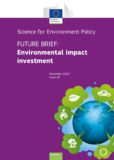Impact investing refers to investments that intend to generate measurable social and/or environmental impacts, as well as a financial return. It is often described as ‘doing good while doing well’ and is part of a wider strategy to shift finance towards more sustainable projects. This Future Brief from Science for Environment Policy explores research into impact investment, with an emphasis on environmental impact investing in Europe.
Impact investment is reported to be the fastest growing strategy for socially responsible investment (SRI) in Europe (Eurosif, 2016). Like many other socially responsible investment strategies, it seeks to achieve positive social or environmental impacts, but it is generally differentiated by its intention to generate measurable benefits and actively measure these (Eurosif, 2014). It is used to fund a broad range of activities that tackle environmental and social problems and represents a new source of finance for charities, social enterprises and businesses with an environmental and/or social mission in addition to seeking profit – and may offer increased employment prospects in these organisations as a result. It can also help governments fulfil their responsibilities more effectively by financing innovative approaches to public services (Social Impact Investment Taskforce, 2014).






